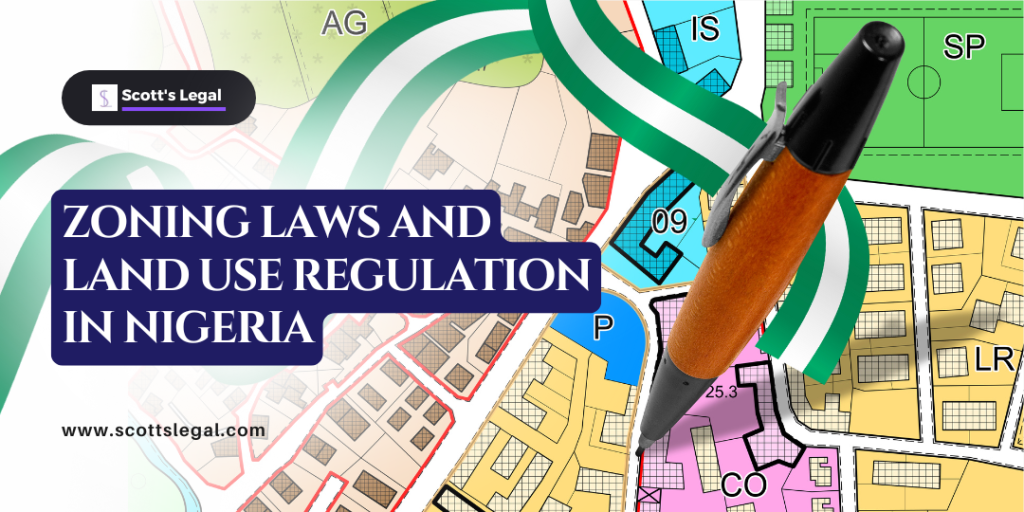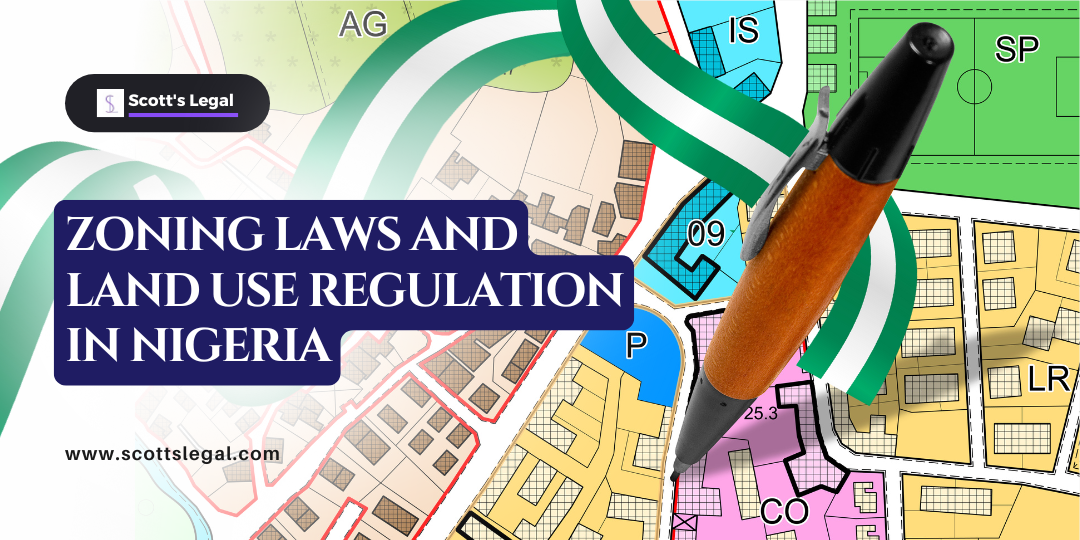For real estate investors in Nigeria, understanding zoning laws in Nigeria is critical, from zoning classifications and land use regulation in Nigeria through to documentation and compliance.
When you’re investing in property in Nigeria, one of the key legal issues to understand is zoning. These land-use rules and regulations govern how land may be used for residential, commercial, industrial, agricultural, or mixed purposes, and they sit at the intersection of urban planning laws, land use regulation in Nigeria, and real estate investment strategy. For the astute investor, a clear grasp of property zoning in Nigeria can mean the difference between a secure, income-generating asset and a costly legal entanglement.

Below is a practical explanation of the legal framework, key features, compliance processes, and investor tips you need when acquiring and owning property in Nigeria under the zoning and land-use regime.
Legal Framework for Zoning Laws in Nigeria
The backbone of zoning laws in Nigeria lies in several layers of legislation and regulation. Real-estate investors should be familiar with the following key instruments:
1. Land Use Act 1978
This Act vests all land in each state in the Governor, holding it in trust for the people. It empowers the Governor to grant rights of occupancy, revoke rights of occupancy for overriding public interest (including land-use conflicts), and requires that all transfers or alienations of land receive the Governor’s consent. For investors, this means that what appears as ownership is actually a statutory right of occupancy, often for 99 years, and is subject to state government powers and urban planning controls.
2. Urban and Regional Planning Act 1992
This federal law provides the institutional framework for urban and regional planning in Nigeria. It establishes state and local planning authorities responsible for preparing master plans and zoning schemes. For investors, this means that a property’s zoning classification must align with the master plan of the relevant planning authority before development.
3. State Physical Planning and Urban Development Laws
Each state has its own planning laws and agencies that regulate zoning compliance. For example, Lagos State operates under the Lagos State Urban and Regional Planning and Development Law (2010), while other states, such as Bayelsa and Rivers, have similar laws. Because these laws differ, land use regulation in Nigeria varies from one state to another, a crucial factor for investors acquiring properties across multiple states.
4. Environmental and Related Laws
Zoning and land-use rules intersect with environmental legislation such as the Environmental Impact Assessment (EIA) Act, which mandates environmental assessments for large-scale projects. Investors should therefore view zoning laws as part of a broader framework that includes environmental, safety, and planning considerations
Key Features of Zoning and Land-Use Regulation
Understanding how zoning operates will help investors evaluate land before purchase and make informed decisions.
Land-Use Classifications
Zoning laws in Nigeria divide land into categories, such as:
- Residential zones for housing and related amenities
- Commercial zones for offices, retail, and hospitality
- Industrial zones for factories and warehouses
- Agricultural zones for farming and agribusiness
- Mixed-use zones combining residential, commercial, or other uses
The classification determines what type of structures or activities are permitted and what development controls apply.
Development Controls In Zoning Law
Common development controls under zoning laws include:
- Maximum building height or number of storeys
- Setbacks from property boundaries or roads
- Density or floor-area ratio limits
- Parking and access requirements
- Restrictions in special zones, such as conservation areas or heritage sites, where development may be prohibited
Zoning Compliance and Approvals Process
Before developing or changing land use, the following steps are required:
- Title Verification: Confirm the zoning classification with the relevant planning authority.
- Planning Permit: Obtain a development permit to ensure that the proposed project aligns with zoning classification and building controls.
- Environmental Compliance: For large projects, secure Environmental Impact Assessment approval.
- Building Permit: Submit architectural and structural drawings for approval before construction.
| Investor Checklist for Zoning Compliance | What to Check | Why It Matters |
|---|---|---|
| Title and zoning class | Verify the zone with the planning authority | Ensure the proposed use aligns with zoning laws |
| Planning permit | Ensures a valid and enforceable title | Avoid refusal or demolition of non-compliant structures |
| Building permit | Check for approved setbacks, height, and access | Prevent enforcement or liability issues |
| Environmental clearance | Required for major developments | Avoid regulatory fines or project delays |
| Governor’s consent | Needed for land transfer or mortgage | Ensures valid and enforceable title |
Implications for Real-Estate Investors In Zoning
Zoning affects every aspect of land acquisition, ownership, and development. Investors must understand how zoning impacts both the financial and legal security of their properties. We would examine its impact in the various areas highlighted below.
1. Land Acquisition
Before purchasing land, confirm the zoning classification and its permitted uses. A property zoned for “residential use” may not legally allow a factory or office complex. Ensure the seller holds a valid right of occupancy and obtain the Governor’s consent for the transfer. It’s also wise to consider future rezoning possibilities; while rezoning may increase property value, it can also restrict existing use if planning policies change.
2. Ownership, Title, and Registration
Under the Land Use Act, a Certificate of Occupancy (C of O) or other recognized title document serves as proof of ownership. Transfers, leases, or mortgages require the Governor’s consent, and failure to obtain it can invalidate the transaction. Importantly, even with a valid title, non-compliance with zoning regulations can result in enforcement actions or demolition.
3. Exit Strategy and Investment Security
Non-compliance can lead to fines, permit revocations, or demolition of structures. It can also make it difficult to sell or finance the property, as banks and investors demand verified zoning and title documentation. Consistent due diligence and professional legal guidance help protect your investment.
Challenges and Practical Tips
Common Challenges
- Bureaucratic delays in processing permits and approvals
- Corruption or unofficial payments influencing zoning decisions
- Inconsistent zoning policies across states and local governments
- Unauthorized developments and informal settlements that disrupt master plans
Practical Tips for Investors
- Conduct detailed due diligence on zoning, title status, and compliance history before acquisition.
- Engage qualified lawyers, surveyors, and architects to guide documentation and planning.
- Monitor changes in urban planning laws and zoning updates within your target area.
- Regularly follow up on permit applications and maintain complete documentation.
- Avoid shortcuts. Illegal development may lead to demolition, fines, or loss of investment.
Conclusion
For real estate investors in Nigeria, understanding zoning laws in Nigeria and land use regulations in Nigeria is fundamental. The Land Use Act, Urban and Regional Planning Act, and various state physical planning laws collectively determine how land can be used, developed, transferred, and secured. Zoning compliance is not just a legal requirement; it is a strategic necessity for protecting your investment and ensuring long-term returns.
By performing due diligence, consulting professionals, and staying compliant with urban planning laws, investors can navigate Nigeria’s property market with confidence.
Navigating property laws in Nigeria can be complex, but the right legal guidance makes all the difference.
Other Articles On The Blog
- How To Obtain Building Plan Approval in Nigeria
- Property Development in Nigeria – Its Legal Framework
At Scotts Legal, we provide expert support in property acquisition, title investigation, registration, and property management, helping real estate investors make confident, compliant, and secure decisions.
For consultations and inquiries, send us a message – here.



